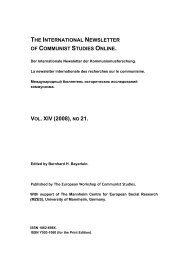11RXNdQ
11RXNdQ
11RXNdQ
Create successful ePaper yourself
Turn your PDF publications into a flip-book with our unique Google optimized e-Paper software.
The Political Thought of Patrice Lumumba *<br />
1<br />
The Venture<br />
Lumumba and Fanon: these two great dead men represent Africa. Not only their nations:<br />
all of their continent. Reading their writings and deciphering their lives, one might take<br />
them to be implacable enemies. Fanon, the great-grandson of a slave, left his native<br />
Martinique, a country which at that time had not yet become aware of the Caribbean<br />
identity and its needs. He espoused the Algerian revolt and fought as a black among<br />
Muslim whites. Drawn with them into an atrocious and necessary war, he adopted the<br />
radicalism of his new brothers, became the theoretician of revolutionary violence and<br />
underlined in his books Africa’s socialist calling: without agrarian reform and without the<br />
nationalization of colonial businesses, independence was an empty word. A victim of<br />
Belgian paternalism – no elite, no bother – Lumumba, despite his vast intelligence, did<br />
not possess Fanon’s learning. On the other hand, he did appear at first sight to have the<br />
advantage over Fanon of working on his own soil for the emancipation of his brothers of<br />
colour and of his own native country. On countless occasions he said that the movement<br />
he was organizing, and whose uncontested leader he<br />
* First published with the title ‘Lumumba et le néo-colonialisme’, as preface to Discours de<br />
Lumumba, Présence africaine, 1963.<br />
became, would be non-violent, and apart from the provocations or a few local initiatives<br />
of which he always disapproved, it was by non-violent means that the MNC 1 established<br />
itself. As for structural problems, Lumumba clearly defined his position in his Présence<br />
africaine lectures: ‘We do not have an economic option.’ By that he meant that political<br />
questions – independence, centralism – came first, that political decolonization had to be<br />
achieved before the instruments of economic and social decolonization could be created.<br />
In fact, these two men, far from fighting each other, knew and liked each other. Fanon<br />
often talked to me about Lumumba; quick to notice when an African party revealed itself<br />
to be vague or reticent on the issue of the re-organization of structures, he never<br />
reproached his Congolese friend for becoming, even unintentionally, the straw man of<br />
neocolonialism. Quite the contrary, he saw in him the uncompromising adversary of any<br />
restoration of disguised imperialism. The only thing he reproached him for – and one can<br />
imagine with what tenderness – was his unshakeable faith in man that was his downfall<br />
and his greatness. ‘He would be given the proof ’, Fanon told me, ‘that one of his<br />
ministers was betraying him. He would go and find him, show him the documents and the<br />
reports and ask him: ‘Are you a traitor? Look me straight in the eye and reply.’ If he<br />
denied it without looking away, Lumumba would conclude: ‘All right, I believe you.’ But<br />
Fanon only considered this immense goodness, which some Europeans have called




